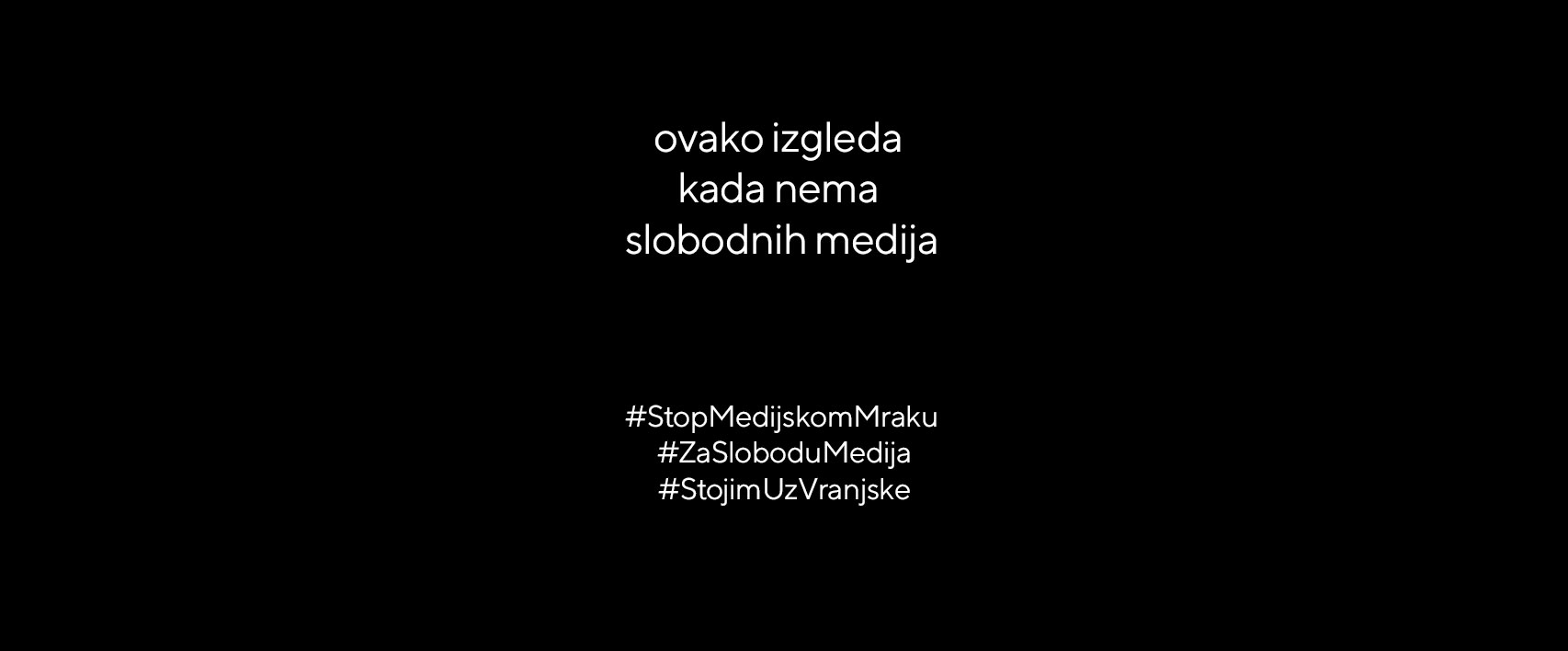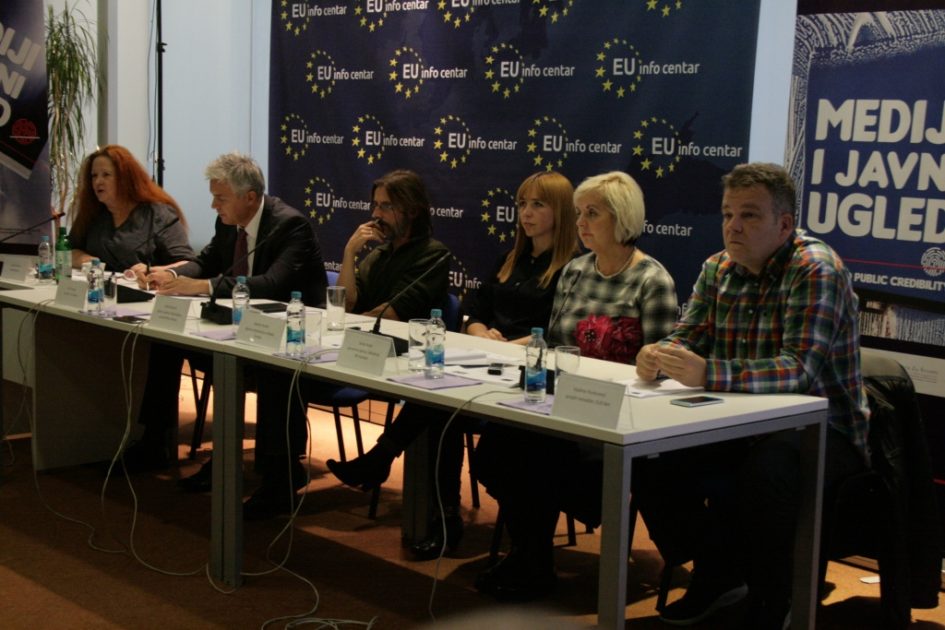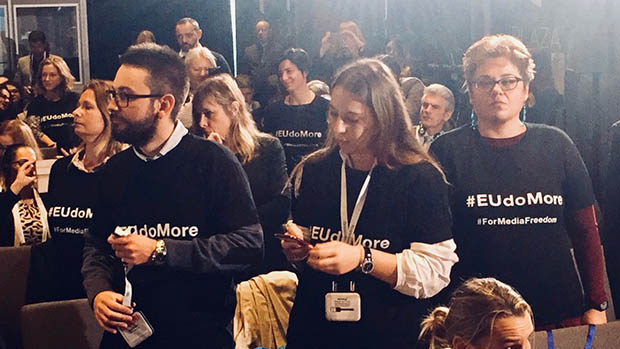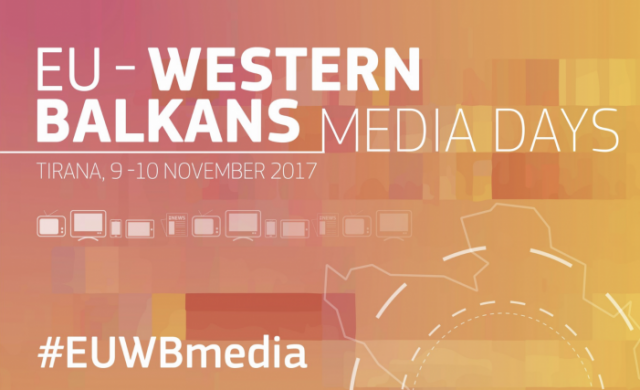BEOGRAD, 14.11.2017. – Predstavnici Grupe za slobodu medija predali su danas predsednici Vlade Srbije Ani Brnabić zahteve za poboljšanje medijske situacije, medju kojima su formiranje nove radne grupe za izradu Medijske strategije, rasvetljavanje svih napada na novinare, kao i povlačenje države iz vlasništva u Politici, Večernjim novostima i Dnevniku i prestanak rada agencije Tanjug, ugašene Vladinom odlukom pre dve godine.
U zahtevima se navodi da novinarska i medijska udruženja, novinari i novinarke, mediji, organizacije civilnog društva i gradjanke i gradjani okupljeni u neformalnoj Grupi za slobodu medija, od Vlade i Skupštine zahtevaju da predstavnici vlasti, prvenstveno najviši državni funkcioneri, prestanu sa javnim prozivkama i pokušajima diskreditovanja novinara i medija.
Oni traže da Vlada, ministarstva, njeni članovi i predstavnici drugih državnih institucija, kada dostavljaju pozive za javne dogadjaje, odgovaraju na pitanja novinara i zahteve medija za intervjue i izjave, na jednak način, bez selekcije i diskriminacije, tretiraju sve medije koji poštuju Kodeks novinara Srbije.
Grupa traži da nadležni državni organi po hitnom postupku rasvetle sve napade na novinare i slučajeve ugrožavanja njihove bezbednosti i pokrenu postupke protiv počinilaca, kao i da hitno sprovedu i objave rezultate analize dosadašnjeg postupanja policije i tužilaštva u slučajevima ubistava i napada na novinare.
Zahteva se da Ministarstvo kulture i informisanja odmah obustavi rad na novoj Strategiji razvoja javnog informisanja, zbog neodgovarajuće metodologije i strukture članova radne grupe, koja je predstavnike najbrojnijih novinarskih i medijskih udruženja onemogućila da suštinski utiču na izradu ovog kapitalnog dokumenta.
Traži se da Ministarstvo u dijalogu sa predstavnicima medijske zajednice i civilnog sektora što pre utvrdi drugačiju metodologiju rada i strukturu nove radne grupe, kako bi Strategija razvoja javnog informisanja bila u najboljem interesu novinarske profesije, medija, njihovih izdavača i gradjana i gradjanki.
Od parlamenta Grupa je zatražila da pokrene postupak razrešenja članova Saveta REM i da se prilikom izbora novih članova Saveta otkloni mogućnost uticaja izvršne i zakonodavne vlasti na predloge drugih predlagača.
“Skupštinski odbor za kulturu i informisanje nije nadležan da ispituje podobnost članova koje su izabrali ovlašćeni predlagači, niti Skupština da odbije da se izjašnjava o predlozima za izbor članova Saveta”, navodi se u zahtevima i dodaje da izmenom Zakona o elektronskim medijima treba definisati takve kriterijume izbora članova Saveta koji bi obezbedili da kandidati budu profesionalci dokazani u svom radu, koji imaju nesporan moralni kredibilitet, kao i da se iz kruga ovlašćenih predlagača isključe organi vlasti i političke institucije.
Grupa traži da se dosledno sprovedu zakoni koji se odnose na završetak procesa privatizacije medija, utvrdjivanje nedržavnog vlasništva u Politici, Večernjim novostima i Dnevniku i povlačenje države iz vlasništva tih novinskih kuća, kao i hitno brisanje JP Tanjug iz Registra privrednih društava, Tanjugovih servisa iz Registra medija i prestanak rada agencije, na osnovu Odluke Vlade Srbije od 3. novembra 2015. godine.
Traži se da se omogući zakonom garantovana uredjivačka i poslovna samostalnost i finansijska nezavisnost javnih medijskih servisa i da Vlada u cilju zaštite njihove uredjivačke nezavisnosti, omogući javnim medijskim servisima da se dominantno finansiraju iz takse, kao što je i predvidjeno zakonom.
Zahteva se i da Ministarstvo kulture i informisanja, Komisija za kontrolu državne pomoći, Državna revizorska institucija, Komisija za zaštitu konkurencije, Uprava za javne nabavke i Savet za borbu protiv korupcije, u okviru svojih nadležnosti, kontinuirano sprovode nadzor i kontrolu trošenja sredstava za projekte na konkursima za sufinansiranje medijskih sadržaja, javnih nabavki za pružanje medijskih usluga i sponzorstva i donatorstva iz javnih prihoda.
Od Vlada se traži da formira nezavisnu komisiju koja će analizirati sistem sufinansiranja medijskih sadržaja u javnom interesu i predložiti mere sprečavanja zloupotreba konkursa na svim nivoima, kao i da Ministarstvo precizira uslove i kriterijume donošenja odluka na konkursima za finansiranje medijskih programa i uvede delotvoran mehanizam za osporavanje odluka o dodeli sredstava, pre nego što ona budu utrošena.
Grupa traži da se poboljša radni položaj novinara kroz striktnu primenu Zakona o radu, u delu poštovanja radnih prava i osnova radnog angažovanja u radnom odnosu i van radnog odnosa, i primenu Zakona o sprečavanju zlostavljanja na radu.
Dodaje se da se od Vlade zahteva da obezbedi izvršenje rešenja poverenika za informacije od javnog značaja i zaštitu podataka o ličnosti koja nisu izvršena, da sama postupi po svim zaostalim zahtevima za pristup informacijama i da ubuduće po tim zahtevima postupa u zakonskom roku, na način propisan Zakonom o slobodnom pristupu informacijama od javnog značaja.
Traži se da se sveobuhvatno i dosledno uredi oglašavanje državnih organa i drugih organa vlasti izmenama zakona o javnim nabavkama ili donošenjem Zakona o oglašavanju organa javne vlasti.
Grupa zaheva da Ministarstvo pravde formira nezavisnu komisiju za izradu evidencije i analizu sudskih postupaka protiv izdavača medija, urednika i novinara, u skladu sa praksom Evropskog suda za ljudska prava.
“Zahtevamo dosledno poštovanje autorskih prava u medijskoj sferi i takvu izmenu Zakona o autorskim pravima koja će sprečiti finansijske pritiske na izdavače medija kroz presude sa prekomernim novčanim iznosima za kršenje autorskih prava, takodje u skladu sa praksom Evropskog suda za ljudska prava”, navela je Grupa.
Zahtev je i da Vlada Srbije usvoji dodatne podsticajne mere i olakšice štampanim medijima i regionalnim i lokalnim medijima, koje su taksativno nabrojane u dosadašnjoj Strategiji razvoja sistema javnog informisanja u Srbiji, ali do sada ni jedna od njih nije primenjena, i da razmotri mogućnost utvrdjivanja obaveznog procenta izdvajanja iz budžeta lokalnih samouprava za projektno sufinansiranje medijskih sadržaja od javnog značaja.
Predstavnici Grupe za slobodu medija danas su u Vladi Srbije razgovarali sa Anom Brnabić.










